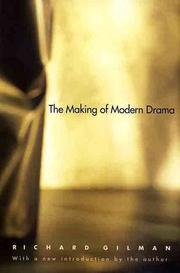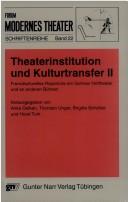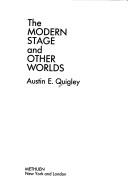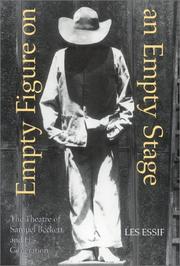| Listing 1 - 10 of 15 | << page >> |
Sort by
|
Book
ISSN: 13763199 ISBN: 9782807601918 280760191X Year: 2018 Volume: 37 Publisher: Bruxelles Bern Berlin, [etc.] PIE Peter Lang
Abstract | Keywords | Export | Availability | Bookmark
 Loading...
Loading...Choose an application
- Reference Manager
- EndNote
- RefWorks (Direct export to RefWorks)
"In 1961, Martin Esslin named a body of plays that lacked plot, character depth, and details of time and space the 'Theatre of the Absurd'. Esslin explained that this type of theatre, minimalist in the extreme, constituted a response to the existential crisis of Europe, which was in the midst of recovering from World War II. But the fact that this body of theatre lacked details of time and space means that we may break the ties that anchor the Theatre of the Absurd irremediably to the historical context of post-World War II Europe. How can the Theatre of the Absurd speak meaningfully to us in the twenty-first century? This book explores this question by combining the avant-garde that Martin Esslin named in 1961 in his signature work The Theatre of the Absurd with gender studies, queer theory, and psychoanalysis, and avant-garde studies. The Theatre of the Absurd is capable of subverting post-millennial institutions and ideologies, including the Prison Industrial Complex and the West's domination of the Islamic world in a post-9/11 era"--
Book
ISBN: 9782843100994 2843100992 Year: 2007 Volume: 69 Publisher: Grenoble Université Stendhal
Abstract | Keywords | Export | Availability | Bookmark
 Loading...
Loading...Choose an application
- Reference Manager
- EndNote
- RefWorks (Direct export to RefWorks)
Comparative literature --- Thematology --- Drama --- anno 1900-1999 --- European drama --- Comic, The, in literature --- History and criticism --- European drama - 20th century - History and criticism
Book
ISBN: 2876613301 9782876613300 Year: 2005 Volume: *1 Publisher: Chambéry Comp'Act
Abstract | Keywords | Export | Availability | Bookmark
 Loading...
Loading...Choose an application
- Reference Manager
- EndNote
- RefWorks (Direct export to RefWorks)
Etudes sur Vitet, Hugo, Quinet, Gautier, Flaubert, Banville, Villiers de l'Isle-Adam, Polti, Roussel, Kandinsky, Kraus, Tzara, Beckett, Adamov, Sarraute, Arrabal, Cixous, Müller, Novarina, ...

ISBN: 0300079028 9780300079029 Year: 1999 Publisher: New Haven, CT Yale University Press
Abstract | Keywords | Export | Availability | Bookmark
 Loading...
Loading...Choose an application
- Reference Manager
- EndNote
- RefWorks (Direct export to RefWorks)

ISSN: 09350012 ISBN: 3823352229 3823352210 9783823352211 9783823352228 Year: 1998 Volume: 21-22 Publisher: Tübingen Narr
Abstract | Keywords | Export | Availability | Bookmark
 Loading...
Loading...Choose an application
- Reference Manager
- EndNote
- RefWorks (Direct export to RefWorks)

ISBN: 0416393209 0416393101 9780416393200 Year: 1985 Volume: 887 Publisher: New York
Abstract | Keywords | Export | Availability | Bookmark
 Loading...
Loading...Choose an application
- Reference Manager
- EndNote
- RefWorks (Direct export to RefWorks)
Theatrical science --- Drama --- anno 1900-1999 --- European drama --- Theater --- History and criticism --- 82-2 --- Toneel. Drama --- Theater. --- History and criticism. --- 82-2 Toneel. Drama --- Dramatics --- Histrionics --- Professional theater --- Stage --- Theatre --- Performing arts --- Acting --- Actors --- European drama - 19th century - History and criticism --- European drama - 20th century - History and criticism

ISBN: 2802801511 9782802801511 Year: 2002 Volume: 92 Publisher: Bruxelles FUSL
Abstract | Keywords | Export | Availability | Bookmark
 Loading...
Loading...Choose an application
- Reference Manager
- EndNote
- RefWorks (Direct export to RefWorks)
L'auteur essaie de faire le point sur les différentes manières dont, au fil du temps, a été considéré et pensé le tragique. Elle essaie ensuite sur base d'analyse de pièces particulières comme "Henry IV" de L. Pirandello, d'établir une filiation entre cet auteur ainsi que R. del Valle-Inclan, et les dramaturges de l'après-guerre : Beckett, Ionesco, ... Elle tend à prouver qu'il n'y a pas, dans l'écriture du drame, une nette cassure due à la deuxième guerre mondiale, mais bien plutôt une continuité, comme si certains dramaturges d'avant-guerre avait senti et compris le malaise des esprits et de la civilisation qui allait déboucher sur la guerre 40-45 et les atrocités que l'on sait.
Theatrical science --- Valle-Inclán, del, Ramón María --- Pirandello, Luigi --- Italiaanse letterkunde --- Littérature italienne --- Théâtre --- Toneel --- European drama --- Tragedy --- History and criticism. --- European drama - 19th century - History and criticism. --- European drama - 20th century - History and criticism. --- Tragedy - History and criticism. --- Bio-Bibliographie --- Ramon del VALLE-INCLAN --- Tragique --- Lazzarini-Dossin, Muriel

ISBN: 0253338476 9780253338471 Year: 2001 Volume: 13 Publisher: Bloomington, Ind. Indiana University Press
Abstract | Keywords | Export | Availability | Bookmark
 Loading...
Loading...Choose an application
- Reference Manager
- EndNote
- RefWorks (Direct export to RefWorks)
This study considers the ways playwrights draw meaning from emptiness. With reference to actual performances of dramatic works, Les Essif examines drama associated with nonrealistic movement known as theatre of the absurd, focusing on the ways dramatists create an impression of emptiness not only on the stage but also in the body and mind of the central character. Essif makes a case for the meta-dramatic fusion of stage and character. Empty Figure on an Empty Stage begins with a discussion of philosophical, socio-cultural, and theatrical implications of emptiness. Bringing together pioneers in theatre phenomenology Bert O. States and Stanton B. Garner, Jr., with theatrical thinkers Antonin Artaud and Gordon Craig, and socio-aesthetic thinkers Mikhail Bakhtin and Theodor Adorno, Essif formulates a fresh approach to drama and performance and presents an overview of the evolution of "empty" characters and "empty" space in Western drama. After examining Samuel Beckett's drama and performance, Essif studies works of other dramatists of this generation, primarily from France (Ionesco, Vian, Dubillard, Obaldia), but also from other Western national cultures (Bernhard, Pinter, Stoppard, Handke, Shepard). He supports his thesis with photographs of works of art as well as scenes from theatrical performances of the plays in question.
Theatrical science --- Beckett, Samuel --- Drama --- European drama --- History and criticism --- 20th century --- Beckett, Samuel, --- Criticism and interpretation --- History and criticism. --- Drama - 20th century - History and criticism --- European drama - 20th century - History and criticism --- Beckett, Samuel, - 1906-1989 - Criticism and interpretation --- Beckett, Samuel, - 1906-1989
Book
ISBN: 9052012717 9789052012711 Year: 2004 Volume: 6 Publisher: Bruxelles PIE-Lang
Abstract | Keywords | Export | Availability | Bookmark
 Loading...
Loading...Choose an application
- Reference Manager
- EndNote
- RefWorks (Direct export to RefWorks)
On a pris l'habitude d'identifier la tragédie grecque à son contenu mythologique, la tragédie élisabéthaine à ses intrigues historiques, et le tragique de Racine et de Corneille à la poétique classique. Mais à quoi reconnaître le tragique qui imprègne le théâtre européen des XIXe et XXe siècles? Actes du colloque organisé à l'Université catholique de Louvain en février 2001, enrichis de nouvelles contributions, ce volume tente d'ouvrir de nouvelles perspectives sur ces questions. Pour la première fois, des spécialistes prennent le parti de se concentrer sur des écrivains modernes, salués à des degrés divers comme des rénovateurs de la tragédie : von Kleist, Büchner, Ibsen, Strindberg, Maeterlinck, Tchékhov, Hauptmann, Ghelderode, Garcia Lorca… 
(www.aml.cfwb.be)Qu'est-ce que le tragique ? Et existe-t-il un tragique contemporain ? Fruit d'un colloque, ce volume tente d'apporter, sinon une réponse à ces questions, du moins de nouvelles perspectives. Ses auteurs ont pris le parti de se concentrer sur des écrivains salués, à des degrés divers, comme des rénovateurs de la tragédie : Kleist, Büchner, Ibsen, Strindberg, Maeterlinck, Tchekhov, Hauptmann, Ghelderode, García Lorca… et, transversalement, sur la question du tragique dans les sociétés post-tragiques.
Comparative literature --- Drama --- anno 1800-1999 --- European drama --- History and criticism. --- History and criticism --- European drama - 19th century - History and criticism. --- European drama - 20th century - History and criticism --- Theatre (genre litteraire) --- Ibsen (henrik), 1828-1906 --- Tchekhov (anton pavlovitch) --- Maeterlinck (maurice), ecrivain belge, 1862-1949 --- Ghelderode (ademar martens, dit michel de), auteur dramatique belge, 1898-1962 --- Garcia lorca (federico), 1899-1936 --- 19e siecle --- Histoire et critique --- 20e siecle --- Critique et interpretation --- Vingtième siècle --- Dix-neuvième siècle --- Théâtre --- Théâtre moderne --- Europe --- Tragique
Book
ISBN: 2825102997 9782825102992 Year: 1992 Publisher: Lausanne L'Age d'homme
Abstract | Keywords | Export | Availability | Bookmark
 Loading...
Loading...Choose an application
- Reference Manager
- EndNote
- RefWorks (Direct export to RefWorks)
Acting --- anno 1900-1999 --- Germany --- France --- Italy --- Puppets and puppet-plays --- Experimental theater --- Theaters --- Théâtre expérimental --- Models --- European drama --- Robots in literature. --- Marionettes in literature. --- History --- History and criticism. --- Théâtre expérimental --- Marionettes in literature --- Robots in literature --- Automata in literature --- Alternative theater --- Avant-garde theater --- Theater --- History and criticism --- Experimental theater - Europe - History - 20th century. --- European drama - 20th century - History and criticism. --- Automates --- Avant-garde (esthétique) --- Art dramatique --- Marionnettes --- Europe --- 1900-1945 --- Au théâtre
| Listing 1 - 10 of 15 | << page >> |
Sort by
|

 Search
Search Feedback
Feedback About UniCat
About UniCat  Help
Help News
News